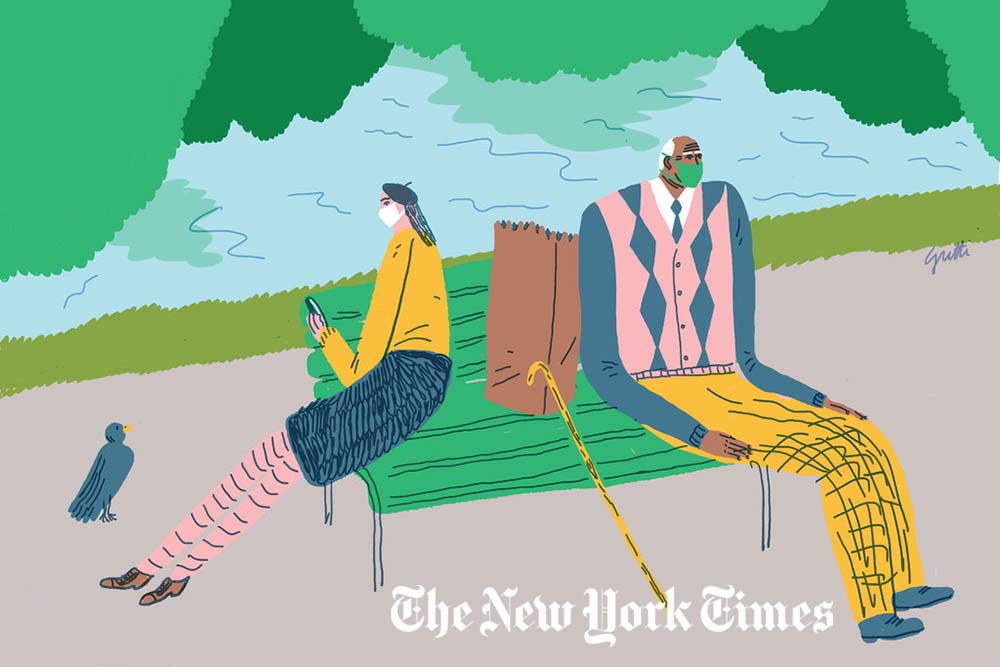I went hoarse shouting at my mother last week.
“You really got into your building elevator with someone else?”
She blamed the other person for standing in the middle of the elevator; I blamed her for getting in, putting herself at risk of catching the coronavirus.
By the time my 88-year-old father got to the phone, I remembered the researcher Brené Brown’s theory that vulnerability opens all doors. I would move my father by sharing my deepest fear.
I told him I loved him. I said the thought of losing him was devastating. I asked him, “Dad, are you afraid?”
He laughed. “What’s to be afraid of? If I get it, Sayonara!”
Despite the virus’s heightened risk to older people, my parents seem inexplicably casual about it.
And I’m not alone. From every corner of our new virtual community, in Zoom cocktail hours, Google hangouts and private message boards, I’ve been hearing from fellow members of the sandwich generation fighting to persuade older loved ones to protect themselves from a potential death sentence from Covid-19.
“My mother’s still going to the market and post office, even though she has an aide,’” said Claire Muirhead, a writer from Los Angeles who recently recovered from Covid-19. “She’s 90. She knows how sick I was, and still, there’s no stopping her. I’m beside myself.”
We have good reason to worry. According to the Centers for Disease Control and Prevention, eight out of 10 deaths reported in the United States have been in adults 65 years old and older.
“We can’t pretend this is not life or death,” said Tara Brach, a psychologist and author of “Radical Acceptance.” “This is the real thing. These are beings we love, and we’re scared we’re going to lose them.”
For some adult children, this means grappling with the anguish of not being able to see parents quarantined in nursing homes.
For those whose parents live independently, it is often a challenge to get our older loved ones to take the risks as seriously as we do. I caught my father-in-law, a radiologist, on his way out to play cards with friends in Boca Raton, Fla., one day before Florida issued its stay-at-home order.
“Just because they’re friends doesn’t mean they don’t have the virus,” I told him. He laughed and said, “We appreciate your concern.” And then he left for his game.
It turns out, according to experts, my approach was doomed to fail.
“If you go in with anxiety and with the very innocent and loving intention to control, every human being on earth will push back against that,” said the sociologist Martha Beck. “There’s something about being self-determined that is fundamental to being human.”
Also at play is a high-stakes role reversal in the parent-child relationship. “Earlier in your life, you were on the other side of this fighting-for-autonomy battle,” said David Fish, a therapist specializing in dialectical behavioral therapy. “Now aging parents are the ones struggling with limitations to their freedom and with others telling them what to do.”
The Age Positivity Effect
Part of the problem, according to Claudia Haase, a psychologist and the director of the Life-Span Development Lab at Northwestern University, is that older adults may not experience the same level of threat as younger people do.
“A massive body of scientific work has documented age-related shifts in the service of making negative emotions smaller and positive emotions bigger,” Dr. Haase says. “Older adults are often masters in turning their attention away from information that is threatening, upsetting and negative.”
The priority of older adults, Dr. Haase explains, is to make the most of their limited time on earth, and their highest value is social connection. “For them, being home alone with just their thoughts and nowhere to go can be a frightening place.”
And then there’s the fact that older adults may not see themselves as, well, old. “Older adults may not think of themselves as being at heightened risk for Covid-19 because old age carries a lot of stigma. There’s a huge reluctance to view oneself in those terms.”
How to Be Heard
So how do you explain your concerns to older relatives?
Dr. Brach believes it begins with self-understanding. “When you talk to them, ask yourself, what’s going on for you? Once you start to name what’s going on underneath under all the agitation, you get to your anticipatory grief: You don’t want to lose them.”
Dr. Beck recommends a simple, practical approach for coping, and managing anxiety, when older relatives don’t see the risks the way you do. “The idea is, you want to invert that — you have to manage your own anxiety first.”
She suggested being direct, providing solid reasoning and being clear about the consequences. “You tell them why you’re worried, and why you want them to do this thing,” she said. “It has to be rational. It can’t just be because ‘I know better and I say so.’”
And you may have to acknowledge the worst-case scenario. “So it might be like, ‘Mom, you’re living in Florida, and you’re going to the beach. I cannot stop you. But if you get sick, I can’t come see you. And if you die, you may die alone, and I won’t be there.’ This may sound harsh, but it’s true. Let them sit with the real possibility of what may happen.”
Radical Acceptance
When all else fails, Dr. Brach espouses the art and power of radical acceptance, both for our loved ones and ourselves.
“There has to be a letting go, because ultimately, you cannot control them,” she said. “They’re responsible for their living and dying.”
Once we understand that, Dr. Brach said, “You say to yourself, ‘I am afraid. I am helpless. I am feeling the grief of what could happen.’ And this is where the real pain is. You put your hand on your heart and offer compassion to the place in yourself that is helpless and fears the loss.”
The act of physically putting your hand on your heart is vital, Dr. Brach said, to coming to peace. “There’s a network of neurons in the heart area. When there’s warmth and pressure on it, it actually calms the sympathetic nervous system and reduces the fear centers in the brain.”
And what about those anxious, racing thoughts?
“We need to remember that just because this feels like it’s a catastrophe doesn’t necessarily mean that it is,” Mr. Fish said. “What you’re upset about right now is your imagination. It’s not what’s actually happening. Our minds are really good at anticipating consequences and making them very present for us, which is useful, except when it’s not.”
This article was originally published in The New York Times.





